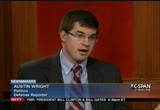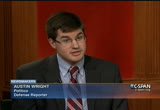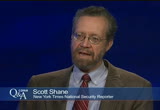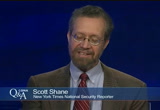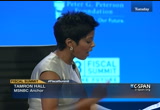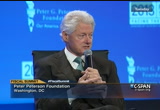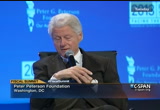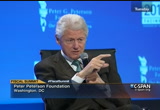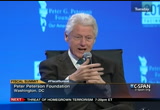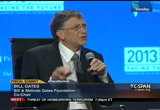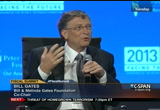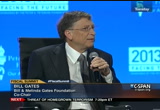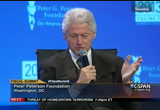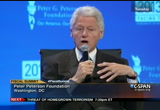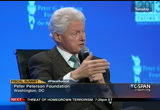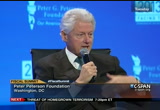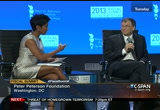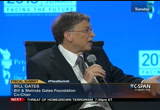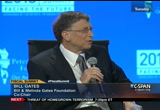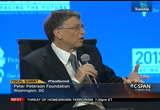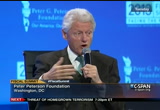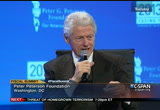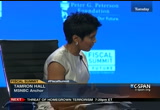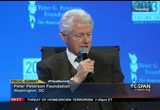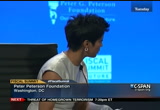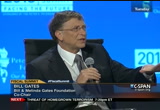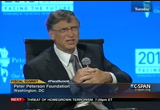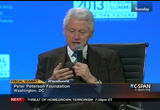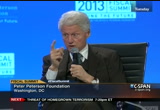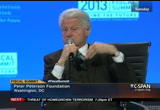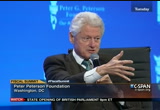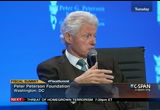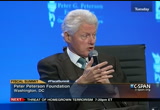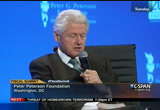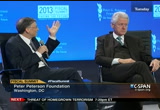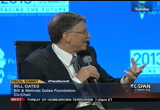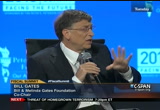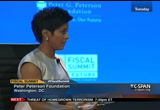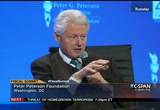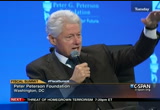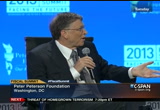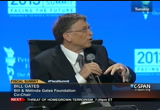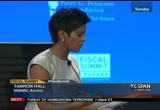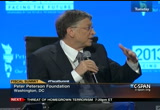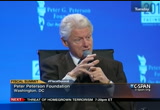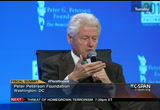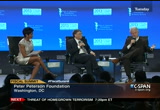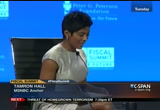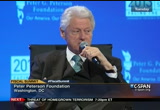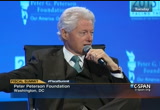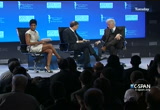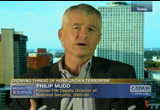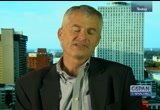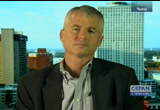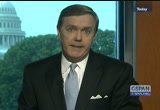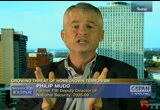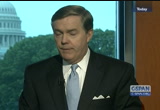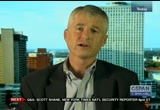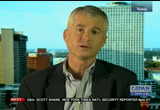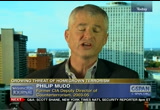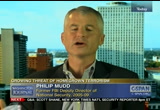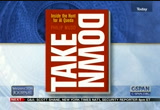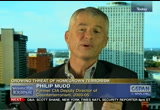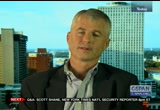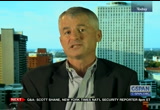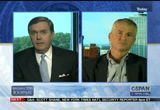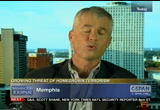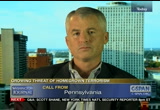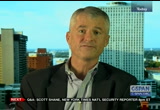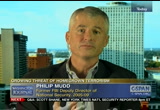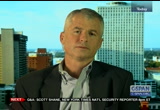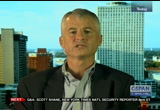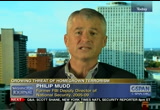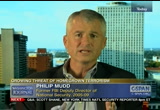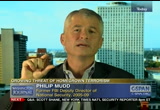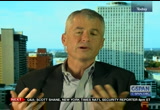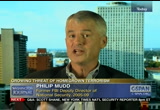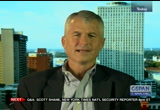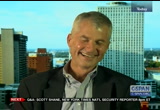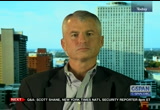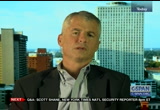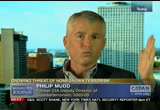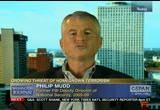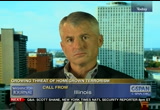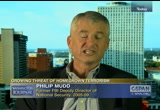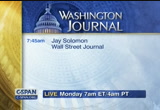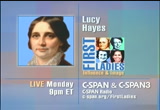tv Washington This Week CSPAN May 12, 2013 6:30pm-8:01pm EDT
6:30 pm
whether they can do that in a strategic manner, whether they can prioritize and cut specific things. or whether they have to do it through the across the board sequester that everyone on both sides of the aisle agrees that it is not a smart way to bring down costs. >> you ask them about possibly taking over as the chairman of the armed services committee. what are you hearing on that? >> i am hearing from people who orked in congress there. he is among a few people that are in the running to take over the house armed services committee. the current chairman, he is 74 years old. there has been some chatter that he might be considering retirement. his staff, of course, denies that. it is looking like the spot could be open.
6:31 pm
he is the vice chairman. he is the numbers two guy. there always is a way to shift it around. but i think he would be the frontrunner. >> thank you. national captioning institute] able satellite corp. 2013] >> next on c-span former president bill clinton and bill gates. then a home grown terrorism threat discussion. >> post 9/11 a lot more people cared about national security issues than the case before. so all of a sudden there was a market for former c.i.a. folks,
6:32 pm
former defense agencies, national former agency, all those guys who are used to operating in the shadows saw a market for their services as common taters, book righters. so there was this somewhat uncomfortable, you know, kind of interaction between the agency and these usually former employees. >> at the time i felt water boarding was something we needed to do. as time has passed and september 11 has moved farther and farther back into history, i think i've changed my mind. and i think water boarding is something we shouldn't be in the business of doing. >> why do you say that now? >> we're we're americans and we're better than that. >> this is a guy who i think by l accounts meant well, who for 15 years ntry
6:33 pm
to take on al qaeda in pakistan and he's going off to prison for 30 months leaving his young family behind. thising weekend on "q&a" on the key story "from spy to source to convict." that is tonight at 8:00 on c-span. >> now former president bill and fillnd businessman atlanta though bit bill gates. heir interviewsed -- interviewed for about 45 minutes. >> i imagine we are ready, gentlemen? we had a great conversation
6:34 pm
behind. i have to start off, i am a texan, i wanted to bring out my tablet or my smartphone for obvious reasons to have my uestions and the comments. but i was afraid my tablet would lock up in the presence of bill gates, and i do not think i could live with that. as a result, my notes, mr. gates and president clinton, look a little bit like a second-rate art project. i want to start with the conversation, picking up on the presentation. i was struck by comments that the fiscal debate is taking up up all the oxygen in the room. that we are not able to look at trends ahead because we are being pulled down by this ongoing conversation that seems easily resolved with compromise. mr. president, you can take a irst stab at that. >> well, it is self-evidently
6:35 pm
true, the problem is that the nature of the debate goes to one the factual dispute and the core of the political differences between the two parties in washington today. actually, i tell you what i think first. i think everybody in this debate has an obligation to say what they believe. i think paul krugman is right in the short run and peep eaters in an simpson-bowles, everybody -- pete peterson an simpson-bowles are right in the long run. if we do not pass a plan in advance, there is always the chance that the economy will start recovering and interest rates will go through the roof and it will make this sequester look like a sunday afternoon walk in the park. do not forget, if interest rates
6:36 pm
today were what they were when i was president we would -- which were pretty low, concerted -- considering we would have growth -- annual payments would go from $300 billion to $650 billion. so, we need to deal with this. secondly, because of the debate, because it is stale it is taking up all the oxygen. but i think a lot of cuts have already been made and in the short run, the president has ffered a long-term plan that basically reflect the private understanding he had with john boehner when they were negotiating. and i think that the best thing to do -- simpson-bowles has done update, which i just read and i think is pretty good. they need to, the simpson-bowles update says we should not put any more real restrictions in
6:37 pm
until 2016 so the economy keeps growing well. it is obvious the defense cuts and general restrictions on public employment have in the near-term slowed the recovery. it is obvious that if you overdo austerity early you get europe, where the and implement rate exceeds 12% -- unemployment rate exceeds 12%. we need to get this off the plate. we are not debating about the future now. if you look at the fix for airline passengers, which since i have to trundle back and forth between here in new york all the time, i appreciate it -- it basically is a metaphor, a ini-metaphor for the choices made in the sequester, where 44% of cuts were from domestic discretionary spending, which is 15% of the budget.
6:38 pm
38% were from defense, 4% from the healthcare and other entitlement programs, and it basically, within the budget of the faa, we are making it possible for all of us to fly with fewer delays and not invest in improving infrastructure of regional airports. that is basically the constant choice we keep making if we just ick the can down the road. we're choosing the present over the future. that is what i think. so i agree. i think if we could get this agreement made it would lift a huge burden and would increase confidence. and they could actually go out and debate something that is worth debating. but if you try to do, which i support, tax reform and the whole thing, and have to relitigate the whole debate about whether there will be any more revenues, i do not see how you will ever get an agreement and we will just keep spinning our wheels. >> if we continue to spin the
6:39 pm
wheels we remain stifled. that brings us to innovation. mr. gates, when you see what is happening, you are not in the dc sausage making business but are certainly in technology. when it boils down to what we can afford and are so concerned on immediate concerns, from the faa to the small pieces of the equation, how do we think big and how do we invest big in america's future? >> well, people say the oxygen is being taken up by the debate. it occurs to me -- the health care cost problem, which is really the long-term problem, he have some retirement obligations because of the aged structure change, but overwhelmingly the healthcare cost, which fortunately omb are honest that it is growing faster than the economy and all it needs is a little bit of time before that
6:40 pm
overwhelms your revenue rates and capability. it is interesting that the amount of deception about how you bend the curve on that is not there. it is not a partisan issue. the partisan issue is, given the costs, should the government or the individual bear the cost? that is fine, but it is definitely a zero-sum discussion of shipping it back and forth. the real question for our ountry is, do we stay on a trend line to eat everything else up? i am very disappointed about the onversation about how you take innovation and measurement and use it to improve the system is not taking place. who is your favorite person in terms of this? even the budget deficit efforts, simpson-bowles and others, which are fantastic, they sort of hand wave.
6:41 pm
by the way, you have to get rid of that piece in there somewhere at some point. so i wish we were having that conversation. this is a place where innovation can either be your enemy, because it is inventing complex things like organ replacement and joint replacement, or it can be your friend, taking on things like chronic care cost, getting rid of parkinson's or alzheimer's or diabetes, where you would have cost savings. so we need to bring in a discussion about how we use innovation and get the efficiencies driven by measurement of quality that is simply not in the system today. >> mr. president, how do we get policymakers -- i was at the final space shuttle launch and i was literally moved to tears and he about how this country thinks big.
6:42 pm
if innovation is not understood by policymakers, how do we look for america's next big thing, so the next generation can feel, as many as you did in the 19 60s and 1970s and as i did at the kennedy space center that day? >> i will give you a very short answer. i would like to amplify on something bill said. that is a whole debate. we are continuing to innovate. there is a stunning amount of advance in human genome research and application. in nanotechnology. lots of other things. we need to do more. one of the few areas that i have clearly disagreed with the simpson-bowles report, i think any tax reform should not get rid of the research and development tax credit because we are already less generous than 15 other countries, and we do not need to do that. we are continuing to innovate. we are not continuing to invest in the future.
6:43 pm
on the public side, as much as we should. here is the problem with what bill said. i think about this all the time. this whole debate, the healthcare debate, has been shoehorned into the budget debate, as bill described. clearly, it is crazy for us to pay 17% of gdp for health care. no other country does. the only rich countries that pay more than us are the netherlands and switzerland. that translates into $1 trillion a year. 43% of which comes from the public sector. so, the people who say we have to privatize medicare or voucher as -- voucherize, and the people who say we have to project and
6:44 pm
keep in be sent on increases to account for both medical inflation and the delivery system as well as the baby boomers getting into the system, they are excepting something that is unacceptable. on the other hand, this is the dilemma. if you can figure out how to solve this we can make a change. we really need about five years to see whether the drivers in the healthcare law, which clearly are trying to give incentives for people to be healthier and incentives for the system to deliver health care where you pay for results, not by procedure, to see if that works. the problem is neither the office of management and budget or the congressional budget office -- they want us to score this and do all this health care stuff based on what is a realistic projection of
6:45 pm
increasing healthcare costs if you keep the insurance system, the delivery system, and our lifestyle exactly as they have been and project them out. we have to change all three of hose things. and if you are not willing to do that we are not going to get anywhere. keep in mind, in 2009, when this economy was on his knees after the crash in 2008, health insurance moffett -- profits rose. when everybody worried about holding onto their business and not losing their own, the engine ground on. and i just read last week that in, on average, if a person is readmitted to the hospital because of a problem, the profit margin on that person for the hospital goes up 300%. which should explain why the
6:46 pm
system in pennsylvania, where the provider needs all the cost when they have to do that, is so successful in holding down costs. why are we still -- why is the government still getting medicated drugs cheaper than medicare drug? there are a thousand questions o be answered. but alternately the dilemma is that we are assuming we are not going to change the delivery system, the financing system, or our personal behavior. if we do not change all three of those things we cannot get our numbers down to where other countries are. >> you have traveled extensively, mr. gates. you just a day trip to south korea. your focus with the gates foundation is vaccines, polio -- we talked a little about it behind-the-scenes. when you look at the domestic debate on health care and what you are seeing a broad in your travels, -- a broad -- abroad in your travels, what stands out to you?
6:47 pm
there seem to be legitimate solutions on the table. >> health care, there are big differences between rich countries, middle income countries, and low income countries. low income countries, which is where our foundation focuses most of the efforts, that, the key missing thing is to have great primary health care where a mother before birth is counseled, first 30 days, the infant gets care and vaccinations get delivered. hiv drugs, tb drugs, malaria drugs get out. there is actually very good rogress on that. with budget deficits in the u.s. nd europe and japan, the traditional donors, there is a reflection on whether the aid budgets will even stay flat. countries have been cutting those. that really hurts low income
6:48 pm
countries. middle income countries like china, they have got a lot of injustice because of what is not covered. yet in some ways because they are more open-minded they are trying different things. there will be good examples to come out of those countries, that even the rich countries should look at. the idea, what are the job categories, how do you measure outcomes? there are a lot of vibrancy there. high income countries are facing the same rate of increase, although we managed to be at a starting point of about 1.5 times worse than everyone else. i got pulled into health not because it is a big foundation priority, but at the state budget level where you have to or at least pretend the balance on a yearly basis there aren't
6:49 pm
some projects having to do with pensions that if they were in the private sector would be considered out and out fraud. because they have to pretend to balance, it education that gets hurt and for our foundation, that is the big doe mostic focus is the education system. ironically, in the last 15 years, a lot of additional money went in and we did improve quality. now in the next 15 years we will look at flat and potentially even down. now we have to get the quality up and the affordability up. it is a pretty daunting problem. but it is one of these things where, what is the long-term plan? how do we step back? the states, by the way, do not control enough to really change the medical picture.
6:50 pm
the scale of their operations, what they are required to do, the reform on this one probably has to come from the federal level. >> one of the things we will have to deal with -- i agree -- is that the price of health insurance is normally approved by state regulators. and they very often are not even expert senate and they approve increases. now, the current law says that for smaller funds, 80% of a person's premium has to go in healthcare. only 20% of profit and promotions. for big insured groups it is 85%. that is supposed to be enforced at the national level. it has played a role in the fact that we had inflation at 4% now for two years for the first time in 50 years. but it is impossible to say what is going to happen when all these new people are insured.
6:51 pm
everyone assumes they will include -- they will all be in small funds, so they will be at 80%, not 85%, and a lot of them will be or sicker and therefore the premiums will start out higher. so there is a lot of talk about that now. but i am agreeing with bill. the national -- we are the only country in the world, the only advanced country in the world with an expensive system that does not have a national healthcare budget. if we had a budget we could do with the republicans want want. we could privatize it all. in the netherlands, for example, 100% of people have private health insurance. there is no medicare, no medicaid, no veterans health system, nothing. everybody buys health insurance and then they get a subsidy according to their income. all individually owned.
6:52 pm
but they have a health budget, which is why they are at 12% and we are at 17.9%. every time anyone talks about that in the past, i have the scars to prove it, they were accused of rationing health care. which of course we do every day n america. >> you say the healthcare debate is being shoehorned into the budget debate. one might also say that is happening with immigration reform. you recently said you expect it to pass, but also made the case that comprehensive immigration reform will help improve the u.s. economy. you might know there was a report just out yesterday, the heritage foundation said $6.3 trillion dollars in new spending entitlements and social programs will be sucked out of the budget if comprehensive immigration eform is passed. your comment is that the u.s. economy will improve.
6:53 pm
>> i disagree. it shows only the downside, the worst-case downside scenario, with none of the upside for immigrants. think of everybody who ever came to this country that started a company or took a good job and built a family and became middle-class taxpayers and send kids to college. it is one side of the ledger. the worst-case scenario on one side of the ledger. i am for immigration reform because we need to be younger than our competitors. we are younger than japan and europe. ireland is the only country in europe where the median ages younger than america. it continues to give us diversity and contacts with the rest of the world. i am for it. there is some dispute about something bill knows a lot more about, which is whether -- i have always favored increasing these visas and getting more skilled workers. everybody in the high-tech field tells me we need more. now there is a little
6:54 pm
debate. people claim they only want to hire people from overseas because they work for less money. i think it is clear that if you get more talented people in this country and make them feel welcome to stay and let them start businesses and do all these things, it will strengthen us. we can handle more people in america and we cannot afford to be in a world where you want to counter budget problems -- have more young people and taxpayers relative to the number of people no longer working and spending your health care money. privately or publicly. >> mr. gates, a number of big names in silicon valley are spending millions right now getting into the immigration debate. people who have been previously described as a political. your name has been listed as being involved. a lot of times we get it wrong, but there are millions coming in
6:55 pm
to participate in this debate on immigration reform. is it about recruiting the best and brightest from other countries for engineering and science jobs? back innovation. >> i am glad to hear i am viewed as apolitical . seriously. it is not a positive label these days to be viewed as political. i do think that thinking just about the technocrat extracts -- facts, how things are measured, is perhaps the best contribution. whether it is improving healthcare or education or foreign aid. i am one of the backers of activities surrounding immigration. immigration -- it is important to separate the pieces. one is the high scale piece. -- high-skill peace. of people coming in, should some portion include those who have computer science skills?
6:56 pm
if i'm a graduate student at uc berkeley in computer science, i am going to get a job for $100,000 a year. the question is, should that job be in india and the jobs created around the person there, or in the united states? that person is going to get hired, i guarantee you. we help provide a great education. the high-skill, peace, there is no doubt of the economic benefits if you are careful. the compromise proposal has all of that. then you have the broad immigration debate where again the economic benefits are very clear. i'm a less expert on this. we are the envy of the world because we have a growing population.
6:57 pm
when you get into what italy and russia and japan are in, shrinking population, that is very bad for investment. the number of working people to retired people is a very tough problem. so immigration has always been a huge sense of vibrancy and economic improvement. so i am hopeful that we get the whole thing pushed through. of all the issues it seems to be the most likely that something will happen. >> i would like to also point out that we need to stop being so arrogant in some of our rhetoric like we are doing everybody a big favor. did read the other day, there was an article that said that every year we had demand for more or less 120,000 people with computer science degrees and in the aggregate on and under ride to it -- undergraduate level we were only producing 40,000. if that is true, why in gods
6:58 pm
name would you not keep everybody here who wants to stay who has an undergraduate or graduate degree, and why would you have a visa program that was not a bureaucratic nightmare to fill the gap? well we are trying to increase more young people in the stem fields, one of the things we did through the clinton global initiative, president obama said we needed another 100,000 stem eachers. we knew the government would not have the money to do this. so we will fill the gap through a totally private commitment. the other thing, we need to be careful. one of the great new stories in the world in the last five years is mexico, which has followed brazil in reducing income inequality. the president who just left, calderon, is too famous for drug wars on the borders and to little known for starting 140
6:59 pm
tuition free universities that produced last year 113,000 engineering graduates. we have had no net in migration for the last two years from mexico. the dream of nafta is going to pay off. they will be are equal trading partner and we will work together to build up the americas. they are getting all sorts of investment from asia moving back here, and in satellite areas. people are coming to the caribbean now. all because we believed in the promise of a partnership with mexico. we should be wanting these people here, not acting like they are knocking down the doors to get here. a lot of those mexican people who went home have better economic opportunities at home than here now. this is good for us. we should do this because it is both morally right and smart economics. >> a facebook question. people submitted questions. the first one. how does our current budget reflects our values and priorities?
7:00 pm
where do we need to adjust? from washington dc >> we need a long-term plan to >> we need a long-term plan to plans the budget that doesn't have so much restriction for the next two years that it slows the economic growth more than austerity already has. we need to -- i think -- i don't have any idea whether in the current climate this is fixable, but what bill said about health care is true and just loading people out of the public system into the private system, which is already more expensive than flickly funded health care is not the answer. if we could figure out some way to score for five years a number we were going to spend and give us the opportunity first. give us five years to try to reform the system and failing that go back to the old meat cleaver approach, i think that would be important. the fundamental problem for me
7:01 pm
oo much money on the present and too little investment in the future and it's all the things that bill has found out in the great work the gates foundation has done on what works on education and it's all this investment stuff. i spent $3 billion of your money node. s human gene now they're saving money at the s. jude's hospital in memphis for $5,000 a map. and it will soon be $500. he had bipartisan agreement to do that. we spent $500 million of your money to do the first federally funded research into thano technology. we have to keep spending money on the future, which includes things that are more expensive like modernizing the infrastructure. >> i want to follow up, president clinton, at the
7:02 pm
democratic national convention you famously said arith me tick. you said the president has offered a reasonable plan. e raises a dollar in new reviews for every amount spent. here we are again going back to juan's remarks just a short time ago of the oxygen, if you will, being taken out of the room and we were back to the initial start of this conversation of how do we move it forward with specifics? >> i don't know, because the -- i think all a president can do is make his proposals and keep playing golf with republicans. in other words -- i'm not making fun of him. i think it's a good thing. in other words, you just have to keep trying to work on it. because the truth is that in the current climate, it's not possible to make the kind of ndividual agreements to put,
7:03 pm
you know, for the president -- the white house can't give things out the way they used to. these guys, their most important thing is never to raise taxes and so they say we already raised taxes. we're never going to do that again and even in tax reform, so i think the only thing i think is that maybe he should go back to the -- start talking about the details of tax reform. i also think that the white house should offer a corporate tax reform without getting all the individual things worked out and they're worried about -- i know exactly what they're worried about. they're worried about a repeal of the extra territorial packet that there will be even more money overseas and tax shelters. i think bill would say this -- there's a great deal of difference in the business operations that microsoft might
7:04 pm
or china or indonesia europe or anywhere and some transaction that is made to look ke it occurred in the cayman islands, when we know it didn't, except for tax purposes. i think there are ways to sort through this. i still wish they'd find some pieces of the puzzle they could do like the tax reform piece. >> i think the question is does our budget reflect our values is a very good question, because as president clinton said, what we've done in the sequester is cut non-defense disdiscretionry spending disproportionaly. it means we cut the budget. in the face of opportunities, we're spending more, and in the face for the needs for innovations that cut these medical suspense increases, we
7:05 pm
cut basic research. we cut the aid budget, where over the last decade, we have been exemplary in spending it better and making sure things like h.i.v. medicines, that the u.s. took the lead in getting those things out there. 20 years ago it was about who are our cold war friends. now it's about real human values, and so certainly the sequester i don't think reflects our values and there will have to be a discussion about funding the future. even before the sequester under the budget control act, congress had said ok, the non-discretionary is going to come down quite a bit and understanding what did that really mean, which programs in there, some of which i think are quite important -- education, research, some of those foreign aid pieces, i think those do
7:06 pm
reflect who we are as a country. until we can get into the long-term piece, the mandatory piece, we're going to be moving away from what i think our unique contribution is and what our values are. >> we know your work, both of you, on education. and this is not a plug for my company, education nation. a lot revealed about the desires for this country moving ahead. i always look back at this quote from you, mr. gates. you said when i was a teenager i was captivated by computers. you said 30 years ago we envisioned a computer on every desktop. that is not happening. we have the passion and we want these things accessible. i did a google chat with eight teachers from the inner stills. that technology wouldn't have been available to us 10, 20 years ago. nevertheless the technology you dreamt of the not available due
7:07 pm
to, i believe, education still not being the priority it needs to be in this country. >> over the next 10 years, the two things that i think will be great in education, one is to get a personnel system that really gives teachers feedback so we can improve the average quality and that actually is only about 3% of the payroll that needs to be invested. we need to do that well. other countries do that. the second dream for education is the use of technology and although we're at a fairly early stage, as you get rid of textbooks, as you get tablet p.c.-type devices. get the best teachers online and personalized learning, there's a lot shaping that and we need to make sure it works for low income, middle income and all times of students. there is a hope that during the next 15 years that education can
7:08 pm
improve a lot. you know, it's the greatest source of inequity in the country today and i think most people accept now that the budgets aren't going to go up much because of health care costs. it's even a height to -- fights to make sure that's the case but i think even in a flat budget era, if we go after the use of technology, we can be optimistic that we'll get back to the equality of opportunity that we try and stand for. >> mr. president, the other end of the spectrum, higher education, and you've recently made a lot of comments about the costs of college and the alternatives that need to be seriously discussed, whether they be online classes, but the amount of debt people are leaving college with and how it affects the economy is stunning. >> well,, the delivery system -- college costs haven't gone up as much as health care but they've gone up roughly twice the rate of inflation over the last 20 or
7:09 pm
30 years. for example, at the end of my term, we passed the biggest increase in financial aid since the g.i. bill and within five years it was all gone in terms of its net impact to the beneficiaries. that is, price increases had caught up and swallowed it. so now we have a new student loan law and it's going to be swallowed. on the other hand, a college degree is still a pretty good deal. yes, not all college graduates are getting higher paying jobs as they were 20 years ago and that won't happen again until the labor markets really tighten up. and yes, some of them don't get jobs, but the unemployment rate among college graduates is still way lower than it is in the population as a whole so it's still a good investment. and i just think we need to,
7:10 pm
both in k through 12 and in the university, we need to consciously talk about this more. for example, i personally think he had more technology and access to sites like the con academy, the dropout rate would go down. i think kids could learn in different ways and you could integrate different disciplines, like these a-plus schools in north carolina, oklahoma, and louisiana, and we have a couple in my home state of arkansas. they integrate the arts into teaching english, social studies, history, and math and without exception, the dropout rolls go down and the achievement levels equal or surpass the state average inspect poorest schools. there are all these things we know that i think will free teachers up to do whole different functions in a way
7:11 pm
that will really help education and then we have to decide how do you credit them in k through 12, how do you credit these massive online open courses in college and how do you maintain the experience? college and university is not entirely for economics. you know, you do get something out of life learning how to think and being exposed to different people and all that stuff that makes life more interesting. but i think that technology will be a big piece of this but we have to think about how we're going to do it and how we're going to integrate it and credit it. bill knows 100 times more about this than i do. >> everybody is just learning. we're at an early stage and like you, i see very exciting examples of where it has strong possibilities. in the current form it's mostly being usinged by the students
7:12 pm
who are doing well already, so the idea of how do we get it to the inner city kids -- and there will be some hybrid. but some online, where you go and learn the math. the equivalent of a lecture, you do that at home and then you're just doing problem solving, grouping kids together according to where their personal level of knowledge is, that's very promising. education is another thing where the entangle qument of what's the role of the states and the federal government makes it very complicated. as the states have had budget problems, they've raised tuition and withdrawn support and the federal government through more pell and loan money has basically had to make up that equation. now when you talk about what are best practices and how do we measure the output, you have the same dilemma you have in health care. which is if you really
7:13 pm
understood output, then you wouldn't fund some people to do some procedures. various uniforms. are much, much better at providing the right times of kearks giving people opportunity, and we're finally getting some of that data out about outcomes as opposed to just saying ok, do they take in a very good student body. technology has a lot of promise to make this a part of the economy that we bring efficiency, to but we have insent active challenges of how to -- incentive challenges. >> another question -- i've reeled a handful of economists that believe the largest enticements for manufacturing in the near future will shift from cheap labor to cheap energy. what are some other alternatives you see in our current energy problems? mr. gates, you've talked about raising the living standards of the world's poorest and some of
7:14 pm
the complexities included which include cheaper energy. >> the energy situation in the u.s. is a very positive story. everybody is excited about how low-cost national natural gas means that our electricity prices and our energy independence looks very positive. now in the long term that creates a huge problem in terms f c.o.-2 ecommissions. -- -- emissions. how do you do tax on that so you solve that problem? manufacturing, that's a tiny renaissance in the united states. but the reason people care more about the labor and energy costs animate f it is very sod it's not producing as many jobs as it would in its previous incarnation. that's why we have to get people
7:15 pm
with four-year degrees to match the demand in the economy. but the energy story is quite a positive thing. >> basically every year labor is a smaller percentage of overall manufacturing costs and materials, energy, and transportation are larger partner,. so it shouldn't be -- larger percentages. so it shouldn't be surprising that since the american work force is productive and basically more so than many european work forces and the chinese rising and so forth that we're getting a lot of american manufacturing rising back home. it's very important. increasingly people want to do modern manufacturing where they have their research facilities. they want them close together and it's an important part of the picture and i think we ought to keep working on it. but i think that, if i can say one thing about this energy
7:16 pm
thing -- i think the natural gas boon is good. it's important. or co-2 emissions for gas have what they are for coal and the u.s. has made the biggest gains in greenhouse gas redid you gos of any major economy in the last two years, primarily of shutting down goal -- coal plants and burning natural gas and becoming more efficient. on the other hand, as bill points out, it still emits a lot of carbon into the atmosphere. i think we need basically a three-point strategy. we need to use the gas. we still don't have a program that is comprehensive enough to suit me that recognizes the study that was done the year before last saying that we could buy ourselves 20 more years in slowing down climate change if we got rid of the more rapidly dispurse -- dispersing
7:17 pm
greenhouse gases in an aggressive way. hillary worked a lot on this trying to eliminate car coal burning stove. methane is a huge one. which is basically urban garbage in agriculture and our foundation works a lot on that. the best one i've seen is the chinese agreement recently to phase out hydroflouro carbons, which are basically in air-conditioning units, according to the montreal protocol and they can save a huge amount, like 8 billion tons f co 2 over the next 17 years. we've been continues frustrating n those and -- wed cons trathe on those and use our aid programs to put solar and wind where it is now economically
7:18 pm
with no subsidies, it would make a big difference. i've been arguing that the u.s. all clean it so energy technologies are economical there today without subsidy. it would be good for the economy. good for theirs and ours and it would make a huge statement. that's what i think should be done. but this gas thing has bought us some time and the bringing us some wealth and we ought to make the best use of it. but if we go to sleep and pretend climate change is not happening, that's not the best use of it. >> we have about 20 seconds to go. there's an elephant in the room i have to address quickly, so indulge me. women -- not a donkey, but we can say that. women are clamoring at the edge of our seats wondering what is next. -- now that she's dynamic
7:19 pm
her leadership is unmatched. her voice for women, the poor, families, so i have to ask it. mr. gates, when is me linda jumping into politics? [laughter] [applause] >> we're both very lucky to have amazing wives who keep us on track and do amazing work in their own right. >> president? >> and i don't think melinda is going to run for president. she hasn't mentioned it to me. >> i tip it to you, mr. ? >> she hasn't mentioned to it me -- me either. i don't know what is going to happen, but i know this -- that is the worst expenditure of our time. she's taking a roll in the foundation, she's writing books. she's having a little fun being
7:20 pm
a private citizen for the first time in 20 years and she's -- you know, that's fine, but we need to be worried about the work at hand. all of us do. so whoever the next president is there's a set of choices before him or her to build a more peaceful and prosperous world. it's frustrating when we're going right back to politics as soon as the election is over instead of getting into the grimy details where the future of america will be written, how we resolve these details. i'm paneleder to bill gates a little bit since we work together and he has money and i don't. but the gates foundation, i think may be the best foundation, not just now, ever.
7:21 pm
and part of it is they worry about big things with clarity but they also get into the grimy details. this stuff has to work. all that really matters in the end is whether what you do turns your good intentions into real changes, and it obscures our capacity to do that and plays to our national tendency to attention-deficit disorder when it comes to politics and public problems if we get off on politics too early and forget about the details. >> certainly we hope we stay in the future business and stay focused on innovation and the topics that we discussed today will be followed out throughout the day and the bright and bold kids that we know in this country can certainly be shined upon. thank you both for your time. >> thank you. [applause] >> [captions copyright national cable satellite corp. 2013] >> tomorrow on c-span, guantanamo basement president
7:22 pm
obama has renewed his calls for closing the prison as hunger strikes continue there. our live coverage begins at noon eastern on c-span and c-span radio. then president obama's pick for the number two position in the white house budget office. he testifies on capitol hill to the senate homeland security and governmental affairs committee during his confirmation hearing. live at 3:00 p.m. eastern, also on c-span. next, a discussion about homegrown terrorism with former f.b.i. and c.i.a. deputy director philip mudd. from this morning's "washington journal" this is 35 minutes. host: we welcome philip mudd, joining us from memphis, tennessee, and the book is titled "take down: inside the
7:23 pm
hunt for al qaeda." a veteran of the f.b.i. and the c.i.a., mr. mudd, thank you very much for being with us. guest: thanks. welcome from memphis. host: "what changed at the f.b.i., larger and larger mountains of data, not just what we could quickly accumulate on an individual case, but what we funneled through the system that might match a bit of data collected years ago. we suffered, you write, from data overload, the good and the bad. can you explain? guest: when you're looking at a case, one of the questions official initially is who's the person who might be the suspect? you're getting data on that individual, phone records, emails. that in itself after about a 24-hour period is going to give you so much data you have to have a chart to map it out. but the second stem is that individual in the middle of a
7:24 pm
spider web part of a broader conspiracy? what are the one or two stems out on emails or phone records? automatics with the technology in 2013 you have a mountain of data hard to sort through. host: as you look at what happened with the tsarnaev brothers in boston, what's your takeaway? guest: my takeaway is that americans are looking for problems that they can put in a box, wrap them up and put in a closet. what's the easy explanation that tells you how they got radicalized and where the government went wrong in missing out on the plot? the f.b.i. acknowledged mistakes in the fort hood shooting a few years ago in texas. in this case, as a former pracks decisioner, i see no easy solutions. these are two brothers. they're in the midst of
7:25 pm
conspires sis across the country. they're not communicating with a lot of people oversearks if anybody. they're building a fairly basic device, putting it in an open space. americans are going to want to box this and say there's an easy way to fix this so that it won't happen again. my message is i'm sorry, it will happen again. this one is hard to stop. host: you write -- a lot of this book focusinging on post 9/11, but "the evolution and threat of al qaeda and al qaedaism was clearly evident. you go on to say, the bureaucracy was far more well-oiled and less jumpy than the first years after 9/11. so that's the good news in all of this, correct? guest: that's right. i returned to c.i. in january of 2002 and sat at the nightly threat table where i traded off the nightly briefing to about t
7:26 pm
later became a tv show called "the athlete matrix." we had an excel spread sheet of threats coming in. in 2002, 2003, the volume of threat from credible sources, for example, penetrations of al qaeda was pretty high. and the second, our sense of unknown immediacy. what's going to happen tomorrow. on a friday night you'd be saying is the big one going to happen tomorrow? the sense of the unknown was pervasive. as time went on, 2006, 2007, my sense was that the tide not only was turning but had turned. i thought we might be by losing in 2003. clearly by ticks and 2007, 2008, we were winning. host: what are the lessons from boston? what has to happen that didn't happen? guest: the lessons are going to be difficult because i think they're going to tell us that there's no easy way to stop
7:27 pm
this. there's no quick fix to this problem. this happens in every case -- you put a red team on this that says let me set off timeline, figure out where we could have intervened and figure out if there's a fix to the system. how you trailed information between police and law enforcement that might have helped. i think there might be -- might not be a fix quick. i think the reactions have been knee jerk. people have been looking to say the borrow pros got it wrong. the guys in government once again are bummling idiots. i don't think it's true in an open society you can't stop two brothers who want to get a pressure cooker and buy some fireworks. host: in any government agency, c.i.a., f.b.i., you're going to get threats. the government saying keep an eye on this person. how many, for example, would the f.b.i. be looking into on any
7:28 pm
given day or any given week? >> you're looking at thousands a year. not necessarily thousands -- thousands that crop out any year but at any one time, the top 1% of threats, that is, people who show both capability and intent to conduct an attack and then off sea of information under that that the public never sees that you're trying to sort through every day. are you verifying the threat or are they going to move off the scale? people take that boston case and blow it out. they say why can't you find the next one and the next five? they should reverse their thought process. how do you go from 330 million people and protect their civil rights to boil that ocean down to one drop of water, two brothers in boston. do not take the case and blow it out. take the open society and try and boil it down to two guys and it's not eas
7:29 pm
host: do you think the tsarnaev brothers acted on their own? guest: i think of this in two ways. the first way is operational. did they have people help them build the device? i don't believe so. espite the tragedy we saw, the sophistication -- cities occasion of this plot -- sophistication of this plot is on the lower owned -- end of the scale. were there people who pushed them along? i suspects so were there people who knew what was going on? for example, the wife of the dead con spirit snowier my guess would be yes, but i'm not sure. i would wonder who got in their heads as opposed to did they get help to plan the attack? host: our lines for democrats and republicans. we welcome our
7:30 pm
202-585-3883 is that phone number. join us on twitter, facebook, journal@c e-mail at spahn.org. the book is titled, "takedown," former fbi deputy director of national security. and also the deputy director of counterterrorism at the cia. in the pre-9/11 world, did you others in the intelligence ommunity fathom what would happen on 9/11? >> that's a tough question. i think the people i worked with knew that al qaeda was a threat and they thought they would come dhael, that is to the shores of the united states. you have to reflect back with humility. you have to defend yourself and i have done better? why did i fail? think those of us who looked at this problem pre-9/11 had a difficult time saying 19 people here for years and
7:31 pm
develop a conspiracy that results in 3,000 deaths. have had a hard time fathoming the level of that kind of operation. is a threat.eda they attacked us in yemen, east africa. they stated publicly they were us. ng after >> yet, with all of this, you touched on this point earlier, our own deal with civil liberties, the freedom we have inherently in this country while also protecting the homeland? >> this, to me, was really frustrating as a practitioner. two things re told at different times. after boston, you're told why single u stop every 19-year-old knuckle head that wants to blow something up. months go by, people say are you collecting too much telephones.nd as a security professional first. and american we live in the land of the free, home of the brave. we do not live in the land of
7:32 pm
secure. the first question is not how to balance security and civil liberties. first question is protect civil liberties and as you protect them, find your best to this, but if ike you protect the civil liberties, people like this will get through. >> share with you more from the book "take down." kwoemt, can we continue to paint a picture of hat we're seeing or do we have to sacrifice intelligence because we have an imminent threat that we cannot control. >> i think people worry too much threat.his when i use that phrase, "imminent threat," i refer to terrorism,i lived in, that seemed like an imminent strategic threat on september 12, 2001. episodic threat of two people, in this case, young people, who can damage hundreds lives. but in contrast to what we see warfare or ke gang drug trafficking, human rafficking, the sex trade, the
7:33 pm
balance to me has shifted. terrorism is a problem here. surprised at a bit how much time people spend worrying about it. these my life chasing guys. in contrast to the threats that areaces and those subject to those selling them meth, putting hem into gangs, we're in a better place. cincinnati, democrat's line? >> good morning. what is the take on the benghazi situation? thank you. >> i tell you, it's good to be outside government because i'll than i might be in congressional testimony. used to have a lot of fun in congressional testimony as well. people want to look at the situations in the midst of the things they're looking at like the tragedy we saw in me check saying let this box. black, white, terrorist demonstration.
7:34 pm
we should have intervened with u.s. forces. we should have saved the ambassador. i think it's much tougher than that. i'm confident in that. that is i'm sure there are terrorists on that compound, would have chased on my previous life. civilians ere are around benghazi saying this is cool, let me go to the compound, x-box, burn a building. to say black and white, this was a terrorist attack. aspects that suggests that the popular demonstration that you could have predicted. he world i lived in was not that simple. people want answers to allow them to say it that simple. he government failed, u.s. forces should have been there. let's box this as a mistake and move on to the next problem. not that easy. >> phillip, graduate of villanova. masters at the university of virginia served in the fbi and the cia. the author of the book, "take of the facts are on the table including your family's genealogy. doctors -- >> don't go there. >> going to for a moment.
7:35 pm
>> dr. samuel mudd, infamous assassination of abraham lincoln in 1865. i'm only uel mudd, more than joking, almost prevented me from getting in the cia. i didn't realize what a lack of are aer human politian ifs have. when grow in in 1984, you don't know much about them. coming in the room being a tupid 23 or 24-year-old, it should be amusing because i come rom a family of convicted felons. this is a stupid kid out of grad school. he looked at me god love her and said, what do you mean? i spent the next ten minutes hole g myself out of that explaining i was joking and this goes back to the civil war-era. great, great grandfather. she was not -- she did not find this particularly humorous. >> mobile, alabama with philip mudd joining umemphis.
7:36 pm
blake, good morning. morning. it's ideology y that's difficult to control. cia, in the he military. they're doing it the best they kinds of ll conflicting orders being given agencies different and in different political groups. think that i feel like the western united states just simply not taking this threat these two ecause rothers if they had nuclear bombs, they would have had exploded twice. this to me is similar to communism. the red communism. just happens to be green. people think so politically correct. they don't see the threat. ideology that's a
7:37 pm
problem. millions of people are forced to live into it. >> thanks for the call. confess. i know i'm supposed to be the terrorism guy. i don't buy it. afraid to call radical islam a problem. you ought to think about two it a before you call problem. i'm an analyst. i deal in facts. one, if you compare violence in this country versus iolence in the high with schools, i have ten nieces and nephews. about terrorism with my nieces and nephews. i care about guns, gangs. it.'s we're focused on operations stopping the plot. we're not focused because have i think a huge role of this focused on topping the spread of ideology for places like saudi arabia and pakistan. if you look at the middle east and south asia in 2001 and 2002,
7:38 pm
there's a tremendous amount of anti-americanism, there still is. a tremendous amount of support laden. he wasn't viewed as a wrist, he head of the he state, washington, d.c., new york, the rest of us. the middle east places like iraq, jordan, saudi arabia have said we don't like the these guys don't present a solution because they've killed too many people, places like ims in baghdad and riyadh. so i think the spread of the slowly declining but it will take a long time for it to sort itself out. communism. it's some lesser form of ideological poison. slowly dying. >> let me follow up on that point. paraphrase joe lieberman last thursday before the house committee. majority of ast muslims here in the u.s. and on it.the world are peace loving, kind individuals, point guard working. to say rightly or
7:39 pm
wrongly, those who do commit terrorism in this country tend be either of the muslim faith or they use religion as a motivation. buy into that article p argument? >> if you look at the people i islamic terrorism, of course, of course. a remember we face significant amount of terrorism in this country. something that have nothing to do with it. supremacist, for example, overeign citizen groups, gang activism -- we face a lot of domestic terrorism. thing, people do not like to admit this in this country. guy islamicall this terrorists, you recognize in contrast with the people we took al qaeda in 2002-2003, khalid shaikh ohammad have a veneer of
7:40 pm
ideology that give them an excuse. e shouldn't pretend to understand the ideology they pore port to represent. don't. khalid sheikh mohammed had a veneer of emotion wrapped in ideology. he will never regret it or apologize. he can sit there and tell you why he did what he did. the kid in jail can't really explain it because he doesn't it. stand >> joining us from pennsylvania outside of pittsburgh. good morning. morning. >> i'm 72 years old. absolutely amazed at philip mudd because it's the most i've heard onoint these issues. i agree lutely nothing with. of fixtures and obviously the government and freely as he as did. othing i could say to
7:41 pm
reiterate. i would like to see his words on he news station day after day instead of all of the little small bosses. hey try to put this thing in a timely waste for blame. listen to most of this stuff. is worth reading -- him on his balance and viewpoints. thank you. watching.my dad is you just made my day. six-pack on the beer drinker. e-mails because it goes through an e-mail filter after events after this. most are positive. you would be surprised with the hate e-mails. fact.re not based in if you want to go toe-to-toe with me, i expect to hear facts. bad and they e
7:42 pm
represent a american culture. they don't. "takedown," inside the hut for al qaeda. one of the questions you posed subject on did the the issue of homeland security and terror threats here at home, have access to a source of weapons we could not control? the ow many subjects in u.s. are successfully prosecuted violations.m how do you answer those questions. have as an you intelligence professional is not only identifying the individual the web, it's f what is the effect of the conspiracy. to go down on the conspiracy. that said, if that individual poses a threat to public safety, this is a classic balance in a terrorism investigation, you're them soon without looking for the fuller conspiracy because you can't have them go to a shopping mall because it kills 30 people.
7:43 pm
we afford to go through the investigations or do we have to go down on the guy. the terrorism investigations and prosecutions from the investigations that you expect, hey're expensive, they take a long time, they cost a lot of taxpayer dollars. we take somebody out for violationn -- the gun officer ith a federal $200,000 on aspend terrorism for charges, you tell me that's a failure? get it? prosecute him, go on to the next investigation. i don't get it. > jim is joining us from laurel, maryland, good morning. >> caller: good morning, steve, philip, good morning. i want to second the last caller's sentiment. of our day.dilemma terrorism. i'm curious as to what you would
7:44 pm
say about motivation. i know it's not a black and white question. complicated. eems to me that there are extremists on both sides and the difficulty that we have is that have a huge military side.rial complex on our incredible information gathering apparatus that the world has never seen before. it's our nk to be tempered in our rhetoric and our politics and i think we have failed terribly. >> thanks for the call. we'll get a response. >> i'll say the wrong thing. don't quite understand both the public and sometimes the political reaction i see to events like this. for a couple of reasons. first, the american people tragedy in boston. but it's not a tragedy that fiber of american
7:45 pm
society. we shall not give these punks people who support them the pleasure of seeing us hurt. to mourn the 2ked, mourn them in private, sweep up the glass 57bd move on. what they need is the coverage they got. i don't like to give it to them. he second thing politically is sometimes you have to look in the camera, i believe, and say if you want perfect answers, us to say you want look at those government dummies, they didn't get it again. let me fix government, i'm marter than you are, sometimes you have to have the humility to to make it sure how work politically. maybe it will take three months. people don't like that. i wish we had the humility to say, i'm not sure what happened here, i don't think it looks a disaster. and worse of all, i'm not sure there's a fix. how about it? >> take a second -- you talk about the early
7:46 pm
morning sessions with robert mullen, the fbi director and goss of the cia. who's in the room? who gathers that information? questions are asked? when you lead the morning sessions, what do you do with the information? >> in the fbi -- the situation in the agency and the bureau agency are different. the fbi, i forget -- i erased 7:17, the memory, first briefing of the day. eight, ten people in the room briefer, typically a fairly junior analyst that comes in 1:00, 2:00 in the morning and amasses all of the information from overnight and the day before. so they'll present the top two, going on.r things some of them may be the drum beat of a case in atlanta, ohio, california. then you sit around -- most americans would be surprised. -- i t around casually don't want to say informally, but casually. we've got this one where it's a risk. we do next? and occasionally sit back with seen three, four cases y, ok
7:47 pm
like this. are there things to improve. but i think people would be by the back and forth among the people around the table and last li by the volume of the information. americans can see the tip of the iceberg in a situation like boston and say why don't you like that.eople you're looking at five, ten of those a day. triage in. area take them in in an of limited resources, you have to take one off of the table. off say are withe going to let run?one let the guy go over to pakistan? let the investigation go on for it over toth or turn you as an attorney, prosecute the guy, and go on and get the next case. >> what gets to the president's desk that day? >> that day what is going to get really the top of t -- the top of the crop. the main case every couple of months. is it's a case that's going to be a broader conspiracy of one or two people. going back to europe
7:48 pm
or pakistan. a case that shows the real and threat to america as opposed to the sausage grinder, the day-to-day weed kid wants to put a backpack on in columbus, ohio. that willperiodically get to the president is a perspective piece. hat goes on with home grown terrorism. what goes on for people, for example, let me say the wrong thing. want to come after the president because he's a black american. we have that in the united states. might periodically couple the tactical reasons with the standbacks and say what are the sealing. t we're >> from the twitter page, this question. how do you feel about the lockdown in boston? >> i thought it was the right thing to do. >> there are people who have great economic impact. say, okay, can, i before we go ahead and to icized, i would believe take the other option. he decided not to lockdown. gets out, shoots
7:49 pm
three people in the gas station. going to say.ody critique, are we going to stop with that? i think not. joining us from tennessee, good morning. >> caller: i wanted to find out the attack in boston could to make involvement americans stop supporting chechnya and start putting on russia? >> i don't think so. y view would be if there was ideological involvement for people in chechnya, obviously here's a question of who the brothers stepped up against when they went back home. my guest is they would have been modest. they weren't there that long. they weren't there in the united states. wager, though, if i were in vegas, there was some ideological influence when they home. it doesn't appear to me to have been profound over the course of years. i'm not sure about that.
7:50 pm
the russian angle is worth investigating. to look at theve angle of what you see across the united states of youth whether islamist or sovereign citizen groups. you can look disenfranchised. a veneer that hadn't allowed them to change. going to say actually, i'm going not just because i'm frustrated, it's for a bigger cause. >> good morning. >> national institute of standards and technology acknowledged the building seven acceleration all for over 100 feet on 9/11 meeting no resistance for eight stories. diatribe on the theories, do you know how that could happen without the use of explosives. if something l me is going on beyond two planes going into buildings, i never saw anyt
7:51 pm
that was the most investigated event in fbi history. i heard this comment that you inside the ives building to bring them down. i don't want to spend time on this question. i don't think it's valid. you.hank i agree. we've had that question posed many times before. hopefully that will be the end it. >> we can take them all here. bring them on. >> happy to take the questions. we've been hearing the conspiracy theories on this for years as well. sometimes you have to scratch your head? go down the coffee shop on cooper street in memphis and hopefully no one will know i was on the show so i can forget about the conspiracies. >> joining us in fremont, ohio. the book is called "takedown." good morning. morning, thank you for passing on that last question too. i'm a member of the association officers.gence in 006, i went to a seminar
7:52 pm
tysons corner, virginia. allen. charles i'm sure you know who he is. >> i noe charlie, yeah. 2006 of ned them in radicalized american citizens nd specifically radicalized islamists. do, my question is it has to with the possibility of having a obust domestic surveillance inside america including our intelligence agencies. charlie -- i guess they call them charlie. call him in from the cold. my gosh, he's 80 years old. >> still going, by the way. >> incredible. anyhow, he talked about fusion centers. agencies like he cia and nsa actually communicate with stake local, and lawe,
7:53 pm
enforcement, they all communicate with each other. counterintelligence blending with law enforcement, know they're two big different i know. but my question is, why couldn't it was very interesting what you had to say about our liberties and everything else and just weighing the balance. mi-5 eat britain, we have which is conducting domestic spying since pre-world war ii era. and the britains haven't given p their civil liberties or their freedoms. isn't it -- is it possible that e could develop some type of thing through fusion centers where we could have a robust counterintelligence within the united states? >> robber, thank you for the call. get a response. philip mudd? >> i faced this problem for example the classic question of we don't have a domestic intelligence service for the united states.
7:54 pm
i don't think it's a good idea. i don't think it's a bad idea. it's not necessary. centers in this country. 70 plus police departments in regions like california that are centers to her in say what's our collective view of a problem like gangs or drugs. i happen to work with the fusion centers on that issue. you have the joint terrorism forces within fbi offices bringing police departments together with federal investigators to. to the question of a federal service. that's what the fbi does. except they have the law enforcement prosecutorial function. it's a on i don't think good idea is the reason i don't think it will work. the reason is this -- the grass on the other side problem. ou have in the bureau you can investigate and react together. what you have is you investigate chain of command for intelligence and pass the metropolitan police for prosecution.
7:55 pm
we worked very closely together, in some cases they're embedded. and closer ser together. in some of them in the think we ce site, i could have the respectability to move together with the prosecution. the luxury of build intelligence professionals who don't have to worry about in a way. case i look at both saying both have strengths, both have weaknesses, not sure the grass is greener. if we move to that side, we have between the ridge domestic security service passing away to the fbi. inefficiencies,n six of one, half dozen of the other. >> are you surprised that the we saw in boston did post-9/11 ner in the world. >> i don't use this word lightly, i say somewhere between and shock with the ease of can build that kind conspiracy? i heard the word sophisticated.
7:56 pm
me which part of it was sophistica sophisticate? one guy has cameras all around. a hoody and a baseball cap. cap forward and the hoody over so the cameras can't see you. really? sophistication on every step is limited. so i look at this and say with have lume of stuff we going on in this country when i was at the threat table every ay, the fact that this hadn't happened earlier is just a little short of astonishing. joining us next from naperville, illinois outside of chicago. good morning. morning.r: good i would like to -- this is such a complicated time. the arab unleashed spring. we had sympathy here with else.ous and everything what -- what would you suggest that we could do to like at try to control some of the -- more research is going to be necessary. complicated uch a probl
7:57 pm
problem. call.anks for the we'll get a response. margin of success is zero, zero events, why isn't on gang warfare or gun traffic. that can't be your margin. take one event and say because of that one event happening over years, we have to the way we do business. i'd say quite the opposite. we've been successful. there's a difference between grieving and mourning for people children and people who this d relatives and attack will recognize the threat to the united states. it doesn't. can do.e things that we we have to talk to community so we see law enforcement, need to communities see law enforcement as a friend. we need to get them on the front end when they come to this communicate from day one saying we're not the security service from your home country. we're friendly guys. second and final, we ought not to talk about terrorism.
7:58 pm
we talk about what terrorists can defend. the message for your book "takedown". message is we spent a lot of money. didn't always send it well. we spent it inenfish endly. that's challenge and time. worried asgo home as you were in 2002, i say please worry about something else. has a lot of gifts, it's got a lot of challenges. your topt terrorism in five or ten, i'm the counterterrorism guy. mudd, "takedown -- inside the hunt for al qaeda." that coffee down the street on cooper street. thank you for joining us. it. preciate >> take care. >> on the next "washington sulman discusses the diplomatic options the united states has when dealing syria.he conflict in former u.s. ambassador to syria historical and
7:59 pm
8:00 pm
>> this week on "q&a," "new york times" national security reporter scott shane discusses his recent front page story titlelied "from spy to source to convict" describing his involvement in the cia officer for leaking information to a reporter. >> scott shane back in january, you had something unusual front page in the "new york times" where you led the paper not with a per se news story but something you've been working on for a long time. start
84 Views
IN COLLECTIONS
CSPAN Television Archive
Television Archive  Television Archive News Search Service
Television Archive News Search Service 
Uploaded by TV Archive on

 Live Music Archive
Live Music Archive Librivox Free Audio
Librivox Free Audio Metropolitan Museum
Metropolitan Museum Cleveland Museum of Art
Cleveland Museum of Art Internet Arcade
Internet Arcade Console Living Room
Console Living Room Open Library
Open Library American Libraries
American Libraries TV News
TV News Understanding 9/11
Understanding 9/11